|
|
|
Sort Order |
|
|
|
Items / Page
|
|
|
|
|
|
|
| Srl | Item |
| 1 |
ID:
080086
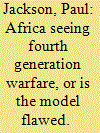

|
|
|
|
|
| Publication |
2007.
|
| Summary/Abstract |
Fourth Generation Warfare is a theory of contemporary warfare that posits a number of different ideas that are able to shed light on current conflicts. Whilst much of the debate has been concentrated on the linear development of warfare and also on analysis of the current situation of US forces in Iraq, it has resonance for a number of different conflicts taking place in Africa, if only because the US has become involved in contemporary conflicts in Somalia and the Mahgreb. There are clearly significant issues with the US-centric, flawed linear approach to history, but the actual analysis of modes of warfare has much to offer policymakers in a continent that is under-represented in the literature, and is also in danger of being forgotten in the shadow of analysis of Iraq. This paper moves on from criticising the stepped approach to history and looks at patterns of warfare in contemporary Africa, arguing that there is much in the theory that could be used to explain seemingly illogical tactics or patterns, and thus has much to tell policymakers engaged in conflict analysis
|
|
|
|
|
|
|
|
|
|
|
|
|
|
|
|
| 2 |
ID:
080087
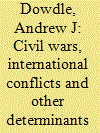

|
|
|
|
|
| Publication |
2007.
|
| Summary/Abstract |
Previous research on African military spending suggests the existence of civil strife as the best predictor of high levels of military spending. However, little is known about why some African nations maintain strong 'auxiliary' or paramilitary organizations while others do not. This study finds that the presence of civil or interstate war does not strengthen reserve or irregular forces. Civilian governments promote strong paramilitary organizations to counter any threat the regular military might pose to regime survivability as a form of clientelist politics
|
|
|
|
|
|
|
|
|
|
|
|
|
|
|
|
| 3 |
ID:
080089
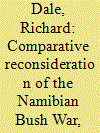

|
|
|
|
|
| Publication |
2007.
|
| Summary/Abstract |
Much of the literature on the decolonization of Namibia is set in a narrative mode and demonizes one or the other of the protagonists. This article, organized in a topical fashion, concerns the diplomatic, military, and economic facets of the Namibian war and draws upon the literature of comparable twentieth century colonial and anti-colonial wars in Algeria, Angola, Kenya, Mozambique, the Philippines, South Africa, Vietnam and Zimbabwe. It explores the changing discourse of legitimacy concerning independence for Namibia, the conduct of insurgency and counterinsurgency in the bush war, and economic aspects of that war.
|
|
|
|
|
|
|
|
|
|
|
|
|
|
|
|
| 4 |
ID:
080090


|
|
|
|
|
| Publication |
2007.
|
| Summary/Abstract |
The illicit global economy is known to fuel numerous conflicts. Yet, the pernicious influence of the drug trade can be felt in many enduring conflicts of the early twenty-first century. This is the case in Iraq where organized crime syndicates, insurgent groups and sectarian militias are creating an incipient narcotized conflict. Without managing this dimension of the war, attempts to curtail violence in the country are very likely to fail.
|
|
|
|
|
|
|
|
|
|
|
|
|
|
|
|
| 5 |
ID:
080092
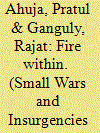

|
|
|
|
|
| Publication |
2007.
|
| Summary/Abstract |
India is at a crossroads today. While it is fast emerging as a global power with a vibrant democratic polity, a robust economy and a nuclear-weapons capable military, the country is also witnessing a growing polarisation between the rich and poor and between urban and rural areas, a rise in communal tensions, large numbers of suicides by impoverished and indebted farmers and a spurt in terrorist activities and attacks by various disgruntled organisations and groups. Of these various challenges, as attested to by Prime Minister Manmohan Singh himself, the most dangerous threat to India's territorial integrity, prosperity and wellbeing has come from the Naxalite insurgency or 'people's war' that is manifest in large areas of eastern, central and southern India. But what factors account for the formation and persistence of Naxalite insurgency in India? What are the key objectives of the Naxalites and why is violence directed against the Indian State? And how has the Indian State (both central and state governments) responded to the Naxalite insurgency and with what effect? These are the main research questions that we attempt to answer in this paper. We put forward two broad arguments. First, the Naxalite insurgency in India is the latest manifestation of peasant struggles caused by grinding poverty, exploitation and inequality that have prevailed in rural areas for centuries. What sustains these struggles to this day is the fact that socio-economic conditions in rural areas have changed little and the policies followed by the post-independent Indian State have generally failed to mitigate rural problems. Second, the Naxalite insurgency has emerged as the most dangerous threat mainly due to the movement's spatial spread, growing support base in tribal and backward areas and enhanced fighting capabilities. The Indian State has viewed the movement as a 'law and order' problem and responded with force. But a 'law and order' approach to the Naxalite insurgency is unlikely to produce a lasting resolution of the problem, since it would not effectively redress deep-rooted grievances felt by a majority of India's rural poor for decades.
|
|
|
|
|
|
|
|
|
|
|
|
|
|
|
|
| 6 |
ID:
080091


|
|
|
|
|
| Publication |
2007.
|
| Summary/Abstract |
This paper analyses the micro-level processes by which ordinary rural Nepalis came to support the Maoist insurgency. Working through the implications of orthodox collective action theory, it finds that Maoist cadres are unlikely to have been strongly motivated by considerations of acquisitive self-interest. However, the participation of many may have been partly secured through various forms of coercion. Non-instrumental motivations for participation that are not accounted for by the rational choice premises that underpin conventional collective action theory are also identified. These are found to have been of particular significance in the violent and uncertain context of contemporary Nepal
|
|
|
|
|
|
|
|
|
|
|
|
|
|
|
|
| 7 |
ID:
080093
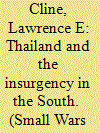

|
|
|
|
|
| Summary/Abstract |
The insurgency in southern Thailand has proven to be intractable over the last few years. The insurgents, who comprise several different groups, have largely retained the initiative in a series of relatively unsophisticated operations. Although involving ethnic Malay Muslims - and marked by an increasingly strong Islamist ideology - the insurgency has been predominantly ethnic rather than religious. External jihadist involvement has been minimal at best. The recent coup in Thailand may improve the odds of reaching some form of accommodation with the southern insurgents; but it is likely that the south will remain a continuing security problem for Bangkok
|
|
|
|
|
|
|
|
|
|
|
|
|
|
|
|
| 8 |
ID:
080088
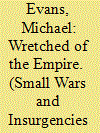

|
|
|
|
|
| Publication |
2007.
|
| Summary/Abstract |
This article examines the vital importance of political ideology in formulating effective counterinsurgency, by examining the case of Rhodesia between 1965 and 1980. During this period, the Rhodesian Front (RF) Government of Ian Smith adopted a radical right-wing 'world-struggle ideology' to justify settler resistance to African decolonisation. The RF's ideology, based on settler-status anxiety, upheld a conspiratorial interpretation of modern politics that emphasised virulent forms of Anglophobia, anti-communism, anti-internationalism and anti-liberalism. The Smith Government portrayed African nationalism not as an indigenous political phenomenon, but as an external instrument of world communism and Western appeasement. After 1972, when Rhodesia faced a protracted insurgency, many of the principles of RF ideology were applied to counterinsurgency warfare with disastrous results. Because the Rhodesian Government viewed African guerrilla warfare as unrelated to domestic politics, Rhodesian counterinsurgency lacked a realistic political dimension. The dictates of settler ideology blinded the Rhodesian Government to the vital need to win 'hearts and minds' by applying timely principles of political pacification and reform to its counterinsurgency effort. Instead a Rhodesian counterinsurgency campaign of maximum force was pursued. Such a campaign proved counter-productive accelerating strategic deterioration and leading ultimately to the political victory of the African guerrilla cause in 1980
|
|
|
|
|
|
|
|
|
|
|
|
|
|
|
|
|
|
|
|
|